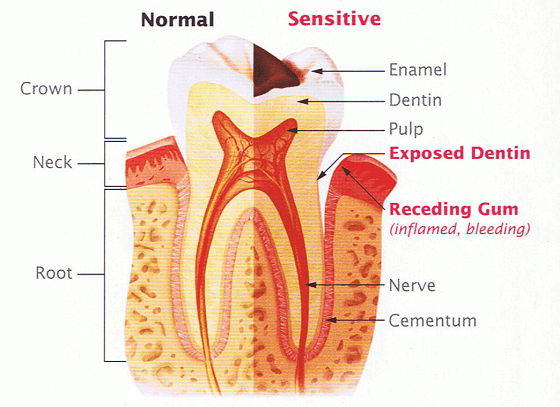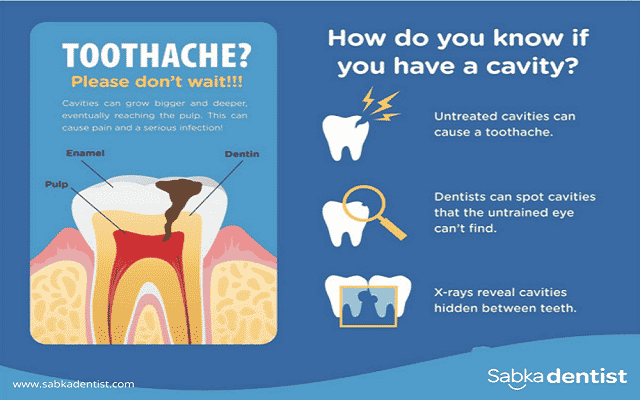Sensitivity
Sensitivity in the teeth is one dental health problem that causes sudden minor pain in the teeth. A person who suffers from sensitive teeth may experience extreme pain when any hot, cold, sweet food or beverage is eaten or drunk. Sensitivity is experienced mainly due to worn fillings, cavities in teeth, gum diseases, enamel layer wearing, and other reasons. Sensitive teeth cause a lot of uncomforting among individuals suffering from tooth sensitivity. There are several reasons for sensitive teeth, and it’s essential to treat them. This can help ensure better oral health for an individual.

Talk to a Dentist Now!

Many say that they have “sensitive teeth”. They usually mean that they feel transient pain or discomfort in their teeth due to the following stimuli:
- Drinking or eating cold things
- Drinking or eating hot things
- Eating an excess of sweets
Pulpal sensitivity tends to affect only a single tooth and is caused by:
- Tooth Decay or Infection.
- A recent filling.
- Excessive pressure from clenching or grinding.
- A cracked or broken tooth.
What do sensitive teeth feel like?
The pain felt in teeth sensitivity is sharp and sudden, in response to an external stimulus. The most common cause is cold stimuli. 75% of people with hypersensitivity report pain upon application because of the cold. Other types of stimuli may also trigger pain in dentin hypersensitivity, including:
- Thermal – hot and cold drinks and foods, cold air, coolant water jet from a dental instrument.
- Electrical – electric pulp testers.
- Mechanical–tactile – dental probe during a dental examination, periodontal scaling, root planing, toothbrushing.
- Osmotic – hypertonic solutions such as sugars.
- Evaporation – air blast from a dental instrument.
- Chemical – acids, e.g. dietary, gastric, acid etch during dental treatments.
- The frequency and severity with which the pain occurs are variable.
How is tooth pain diagnosed?

Our dentist will look at your dental history and will examine your mouth. You will also need X-rays which are free of cost at Sabka Dentist to show if there is decay or a problem with the nerve. The dentist will ask you about your oral habits. The dentist also will look for decay, deep fillings, and exposed root surfaces. They may use an explorer to test teeth for cavities.
Composite fillings require etching the tooth with acid before the filling is placed. In some cases, this etching might make the tooth sensitive. However, advances in bonding now make it less likely to cause tooth sensitivity.
The dentist can do tests to see if you need root canal treatment.
How to cure sensitive teeth/How can you reduce teeth sensitivity?
The cure for teeth sensitivity is with dental treatment or natural methods.
Dental treatment:
- Proper cleaning of the teeth to remove decay and plaque layer.
- Laser treatment.
- Giving a fluoride treatment.
- In case of grinding, provide a proper night guard.
Natural treatment:
- Avoid eating sweet food objects.
- Using fluoridated toothpaste.
- Eating fiber-rich food.
- Intake of plain yogurt.
These are some sensitive teeth pain relief ways. Getting a proper examination is essential.
How do dentists fix sensitive teeth?
Teeth sensitivity is quite treatable, whatever the cause.

Your dentist or dental hygienist will clean your teeth. If your teeth are too sensitive to be cleaned, your dentist may use a local anesthetic before the cleaning. After a cleaning, your dentist may apply a fluoride varnish.
The principle of tooth sensitivity treatment is either occlusion of dentin tubules (e.g. resins, varnishes, toothpaste) or desensitization of nerve fibers/blocking the neural transmission (e.g. potassium chloride potassium citrate, potassium nitrate). A newer approach is to use a dental laser. The laser treatment also alters the tubules to reduce sensitivity.
Using fluoride toothpaste and fluoride mouth rinses at home will help to reduce sensitivity. You also can buy sensitivity toothpaste just for sensitive teeth. Talk to your dentist about which fluoride rinses you should use. Some over-the-counter rinses are acidic. Others are not. You should choose a fluoride mouth rinse that uses neutral sodium fluoride.
Pulpal sensitivity will be treated with a root canal if the tooth’s nerve is damaged or dying. Your dentist will remove the nerve and place a non-reactive substance (gutta percha) in the space where the nerve was.
The tooth no longer will have a continuous barrier of enamel to protect it. Therefore, it will be restored with either a composite filling or a crown. To reduce pain due to grinding or clenching, the dentist will make a plastic night guard. Use the guard while you sleep.
Deal with Your Tooth Enamel
If you have touchy teeth, it’s conceivable a portion of your finish has eroded.
To forestall or slow down that harm opt for tooth sensitivity treatment:
Try not to brush excessively hard. Hard brushing may spoil the condition of the teeth and even lead to the loss of enamel from the gumline. You should utilize a delicate bristled brush and work at a 45-degree point to your gum to keep the finish spotless and solid.
- Maintain a strategic distance from acidic nourishments and beverages. Pop, clingy candy, high-sugar carbs – these treat assault polish. Rather, nibble on:
- Fiber-rich foods grown from the ground
- Cheddar
- Milk
- Plain yogurt
When To Call a Professional
If sensitivity lasts for longer than a few weeks, contact Sabka Dentist. If you have a scheduled cleaning coming up soon, talk to our dentist about your sensitivity during your appointment. In most of the cases, teeth sensitivity is easy to treat.
Sabka dentist provides proper treatment for teeth sensitivity. They will examine the reasons for sensitive teeth. Afterwards, they can provide proper sensitive teeth pain relief. Come to Sabka’s dentist to get better teeth sensitivity treatment.
Expert's Opinion
- Dr. Manan Dhulia Dental Director of Sabka dentist says “Sensitivity involves sensation of sharp, temporary pain in your teeth during brushing, eating or drinking.Usually, hot and cold stimuli accentuate the pain.”
- Dr. Priyanka Shingore Dental Director of Sabka dentist says ”Sensitive teeth are typically a result of exposed dentinal tubules, worn out enamel, exposed tooth root etc.”
- Dr. Jena Shah Dental Director of Sabka dentist says “Treatment options for sensitive teeth includes use of desensitizing toothpaste, bonding, surgical gum graft for exposed roots etc.”
Frequently Asked Questions
What are the causes and remedies for teeth sensitivity?
Teeth sensitivity or Dentin Hypersensitivity is dental pain arising from exposed dentin surfaces in response to any stimuli like thermal, chemical, electric, etc.
Following are the main causes:
- Gingival Recession (Receding gums) that exposes root surfaces, results in loss of cementum layer and tooth wear
- Tooth erosion caused by GERD, Bulimia or Excessive consumption of acidic foods and drinks
- Faulty brushing technique resulting in Dental Abrasion
- Chronic Periodontitis/Gum Disease
- Fractured tooth
- Worn out fillings/ Dislodged restoration
- Teeth clenching habit/ Bruxism
- Dental bleaching
- Smoking tobacco
Mechanism:
Dentin layer of a tooth contains thousands of dentinal tubules which have plasma like fluid. Changes in the flow of this fluid can trigger mechanoreceptors present on nerves at the pulpal aspect. This triggers transient, intense pain. Changes in hydrodynamic flow of this fluid is stimulated by cold, sour, air pressure, drying, sugar, etc.
Following are the remedies:
Teeth Sensitivity is treated by either obtunding these dentinal tubules (varnishes/ resins/ toothpastes) or desensitization of nerve fibers/blocking neural transmission ( potassium nitrate).
Silver Diammine Fluoride has proved to be most effective. Also, gingival erosion and cervical tooth wear can be avoided with healthy oral hygiene and dietary practices. Proper brushing technique (Modified Stillman’s or Modified Bass Technique).
What is the best toothpaste for teeth sensitivity?
GC Tooth Mousse Plus is the most effective and should be used if directed by the dentist. It contains fluoride and CPC – ACP that buffers free calcium and phosphate ions to maintain supersaturated state that inhibits demineralization and promotes remineralization.
Sensodyne is also effective as it contains potassium nitrate. The potassium ion hyperpolarizes the nerve and stops it from firing. The nerve impulses are thus desensitized and there is no pain.
What does sensitive teeth feel like?
Pain of Sensitivity is sharp and sudden. It is triggered by several factors, with cold stimuli being the most common. Triggers include cold and hot foods and drinks, cold air, coolant jet of water from dental instrument, scaling and root planing, hypertonic sugary solutions, air blast from dental instrument, acidic etch, gastric acid reflux, etc.
How do you tell if you have cavity or just sensitive teeth?
Clinical dental examination and Radiographs can be instrumental in the diagnosis of the condition. However, it should be known that the nature of pain is different for both sensitivity and cavitations.
Sensitivity pain is transient and intense and is only triggered by certain stimuli. Pain due to caries varies. It can be continuous, dull, radiating, intense, etc, depending upon the extent and duration of caries.
How to stop sensitive teeth pain?
- Use of desensitizing tooth paste.
- Use of soft bristled brush.
- Avoid food that is highly acidic in nature.
- Use of fluoridated mouth wash.
- Use of mouthguard in case of teeth clenching/bruxism habit.
- Use of fluoride gel or varnish.
- Bonding Treatment, Crown Restoration or Inlay Restoration, if directed by dentists.
- Gum augmentation periodontal surgery for root coverage.
Can teeth sensitivity go away?
Tooth Sensitivity never completely disappears, unless its cause is addressed and treated.
What are sensitive teeth symptoms?
- Pain in the teeth while eating or drinking any hot, cold, or sweet items.
- Visible plaque layer on the teeth surface.
- Difficulty in food chewing.
- Gum problem.
What are the reasons for sensitive teeth?
There might be some reasons for teeth sensitivity or a combination of them. Here are some reasons for sensitive teeth:
- Teeth filling done recently
- Tooth decay
- Infection
- Grinding or clenching of the teeth
About Author

Dr. Priyanka graduated in 2008, obtained her BDS degree from the faculty of dentistry at the Maharashtra University of Health Sciences. Upon graduating, she was selected to complete a multi-disciplinary hospital residency at Government Dental College and Hospital, Mumbai. This residency provided her with advanced training in all the specialties of dentistry. Dr. Priyanka then moved to private practice, working as an associate dentist.
Dr. Priyanka has a diploma in Soft Tissue Lasers from IALD and fellowship in Implant & Esthetic Dentistry. Dr. Priyanka completed MBA in Hospital Management and Clinical Research. She has worked at Sabka Dentist since 2012 and is pleased to say that their advanced technology allows dentists like her to provide patients with painless, gentle dentistry and a pleasant experience.



